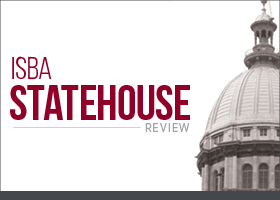ISBA Statehouse Review for May 30, 2019
 ISBA Director of Legislative Affairs Jim Covington reviews legislation in Springfield of interest to ISBA members. This week he covers involuntary commitment, advance directives, special interrogatory, the Mechanics Lien Act, the Home Repair and Remodeling Act, indigent fees and costs, judicial admonishment in sentencing, and the LLC Act cleanup.
ISBA Director of Legislative Affairs Jim Covington reviews legislation in Springfield of interest to ISBA members. This week he covers involuntary commitment, advance directives, special interrogatory, the Mechanics Lien Act, the Home Repair and Remodeling Act, indigent fees and costs, judicial admonishment in sentencing, and the LLC Act cleanup.
Involuntary commitment. Senate Bill 1702 (Morrison, D-Deerfield; Gabel, D-Evanston) authorizes a psychiatrist to examine a respondent for involuntary commitment using the existing rules for video certifications that are already being used in telemedicine. (Passed both chambers.)
Effective Jan. 1, 2020.
Advance directives. Senate Bill 182 (Morrison, D-Deerfield; Moeller, D-Elgin) requires that the Department of Public Health study the feasibility of creating a statewide registry of advance directives and POLST (practitioner order for life-sustaining treatment) forms. It also allows the various advance directives to be in hard or electronic format. (Passed both chambers.)
Effective Jan. 1, 2020.
Special interrogatory. House Bill 2233 (Thapedi, D-Chicago; Mulroe, D-Chicago) amends the special interrogatory provision in the Code of Civil Procedure to do the following: (1) Makes it discretionary with the court on whether to give a special interrogatory if requested by any party. It is now mandatory if any party requests. (2) The appellate standard to review a trial court’s decision on such a request is abuse of discretion. (3) If a special finding of fact is inconsistent with the general verdict, the court is required to direct the jury to further consider its answer and verdict. If the jury can’t render a general verdict consistent with the special finding, the court must order a new trial. (4) During closing argument, the parties are allowed to explain to the jury what may result if the general verdict is inconsistent with any special finding. (Passed both chambers.)
Effective immediately and will apply to trials commencing on or after Jan. 1, 2020.
Mechanics Lien Act. Senate Bill 62 (Castro, D-Elgin; Costa-Howard, D-Lombard) corrects a technical error in the Mechanics Lien Act from PA 100-1061 affecting expired liens. In that Act, there was inconsistent language concerning the effect of a bankruptcy. Because it may be unclear, it could be argued that the statute required that the recorder should only check for bankruptcies if there is no work completion date in a recorded mechanics lien claim. But this does not change the effect of the bankruptcy code, which applies regardless. (Passed both chambers.)
Effective immediately.
Home Repair and Remodeling Act. House Bill 2643 (Mason, D-Gurnee; Bush, D-Grayslake) provides that a consumer age 65 and older has 15, rather than three, business days within which to cancel a contract if the sale is made at the consumer’s home. Limits this 15-day right of cancellation to purchases made from an uninvited solicitor.
Effective immediately. On concurrence in the House awaiting passage.
Indigent fees and costs. Senate Bill 1504 (Mulroe, D-Chicago; Parkhurst, R-Kankakee) repeals last year’s enactment that required a lawyer to pay for the waived fees and costs of an indigent if the lawyer entered an appearance on behalf of the indigent in a civil matter after the waiver. (Passed both chambers.)
Effective immediately.
Judicial admonishment in sentencing. Senate Bill 1610 (Sims, D-Chicago; Cassidy, D-Chicago) amends the statute in which trial judges are required to advise all defendants before a plea of guilty that a conviction may have collateral consequences if they are not U.S. citizens, such as a denial of citizenship or deportation. Senate Bill 1610 clarifies that this is mandatory to give this admonishment by giving a defendant a right to petition the court within two years from conviction to allege that they were not given this admonishment and seek the plea be vacated for retrial. (Passed both chambers.)
Effective Jan. 1, 2020.
LLC Act cleanup. Senate Bill 1495 (Harmon, D-Oak Park; Didech, D-Buffalo Grove) makes a number of changes to the 2016 rewrite of the LLC Act. The most important change clarifies liability under Section 10-10. Several Illinois appellate opinions have interpreted this Section to hold that tortfeasors and persons who have liability to third persons under other laws are shielded from liability in ways that was never intended by the Uniform Law Commission nor good policy. (Passed both chambers.)
Effective Jan. 1, 2020.

